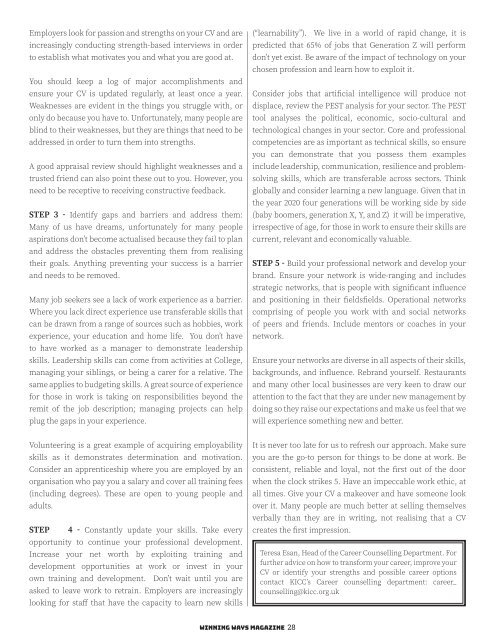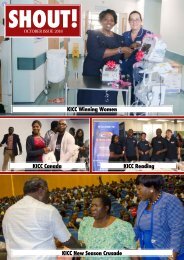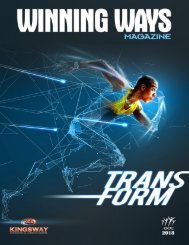WWMAG2018LAYOUT
You also want an ePaper? Increase the reach of your titles
YUMPU automatically turns print PDFs into web optimized ePapers that Google loves.
Employers look for passion and strengths on your CV and are<br />
increasingly conducting strength-based interviews in order<br />
to establish what motivates you and what you are good at.<br />
You should keep a log of major accomplishments and<br />
ensure your CV is updated regularly, at least once a year.<br />
Weaknesses are evident in the things you struggle with, or<br />
only do because you have to. Unfortunately, many people are<br />
blind to their weaknesses, but they are things that need to be<br />
addressed in order to turn them into strengths.<br />
A good appraisal review should highlight weaknesses and a<br />
trusted friend can also point these out to you. However, you<br />
need to be receptive to receiving constructive feedback.<br />
STEP 3 - Identify gaps and barriers and address them:<br />
Many of us have dreams, unfortunately for many people<br />
aspirations don’t become actualised because they fail to plan<br />
and address the obstacles preventing them from realising<br />
their goals. Anything preventing your success is a barrier<br />
and needs to be removed.<br />
Many job seekers see a lack of work experience as a barrier.<br />
Where you lack direct experience use transferable skills that<br />
can be drawn from a range of sources such as hobbies, work<br />
experience, your education and home life. You don’t have<br />
to have worked as a manager to demonstrate leadership<br />
skills. Leadership skills can come from activities at College,<br />
managing your siblings, or being a carer for a relative. The<br />
same applies to budgeting skills. A great source of experience<br />
for those in work is taking on responsibilities beyond the<br />
remit of the job description; managing projects can help<br />
plug the gaps in your experience.<br />
(“learnability”). We live in a world of rapid change, it is<br />
predicted that 65% of jobs that Generation Z will perform<br />
don’t yet exist. Be aware of the impact of technology on your<br />
chosen profession and learn how to exploit it.<br />
Consider jobs that artificial intelligence will produce not<br />
displace, review the PEST analysis for your sector. The PEST<br />
tool analyses the political, economic, socio-cultural and<br />
technological changes in your sector. Core and professional<br />
competencies are as important as technical skills, so ensure<br />
you can demonstrate that you possess them examples<br />
include leadership, communication, resilience and problemsolving<br />
skills, which are transferable across sectors. Think<br />
globally and consider learning a new language. Given that in<br />
the year 2020 four generations will be working side by side<br />
(baby boomers, generation X, Y, and Z) it will be imperative,<br />
irrespective of age, for those in work to ensure their skills are<br />
current, relevant and economically valuable.<br />
STEP 5 - Build your professional network and develop your<br />
brand. Ensure your network is wide-ranging and includes<br />
strategic networks, that is people with significant influence<br />
and positioning in their fieldsfields. Operational networks<br />
comprising of people you work with and social networks<br />
of peers and friends. Include mentors or coaches in your<br />
network.<br />
Ensure your networks are diverse in all aspects of their skills,<br />
backgrounds, and influence. Rebrand yourself. Restaurants<br />
and many other local businesses are very keen to draw our<br />
attention to the fact that they are under new management by<br />
doing so they raise our expectations and make us feel that we<br />
will experience something new and better.<br />
Volunteering is a great example of acquiring employability<br />
skills as it demonstrates determination and motivation.<br />
Consider an apprenticeship where you are employed by an<br />
organisation who pay you a salary and cover all training fees<br />
(including degrees). These are open to young people and<br />
adults.<br />
STEP 4 - Constantly update your skills. Take every<br />
opportunity to continue your professional development.<br />
Increase your net worth by exploiting training and<br />
development opportunities at work or invest in your<br />
own training and development. Don’t wait until you are<br />
asked to leave work to retrain. Employers are increasingly<br />
looking for staff that have the capacity to learn new skills<br />
It is never too late for us to refresh our approach. Make sure<br />
you are the go-to person for things to be done at work. Be<br />
consistent, reliable and loyal, not the first out of the door<br />
when the clock strikes 5. Have an impeccable work ethic, at<br />
all times. Give your CV a makeover and have someone look<br />
over it. Many people are much better at selling themselves<br />
verbally than they are in writing, not realising that a CV<br />
creates the first impression.<br />
Teresa Esan, Head of the Career Counselling Department. For<br />
further advice on how to transform your career, improve your<br />
CV or identify your strengths and possible career options<br />
contact KICC’s Career counselling department: career_<br />
counselling@kicc.org.uk<br />
WINNING WAYS MAGAZINE 28
















